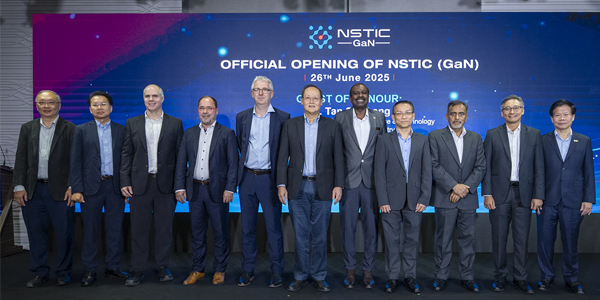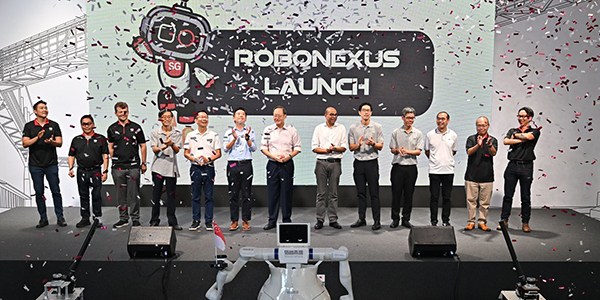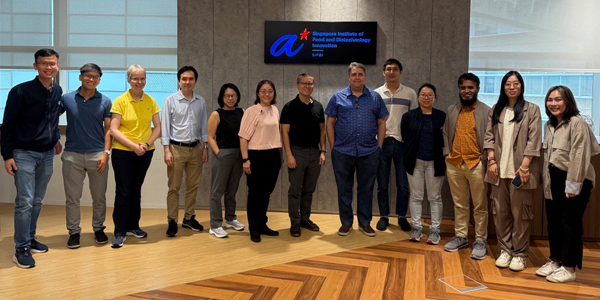A*STAR NEWS
PRESS RELEASES
Singapore Confers Honorary Citizen Award On A*STAR Board Member Professor William Chin
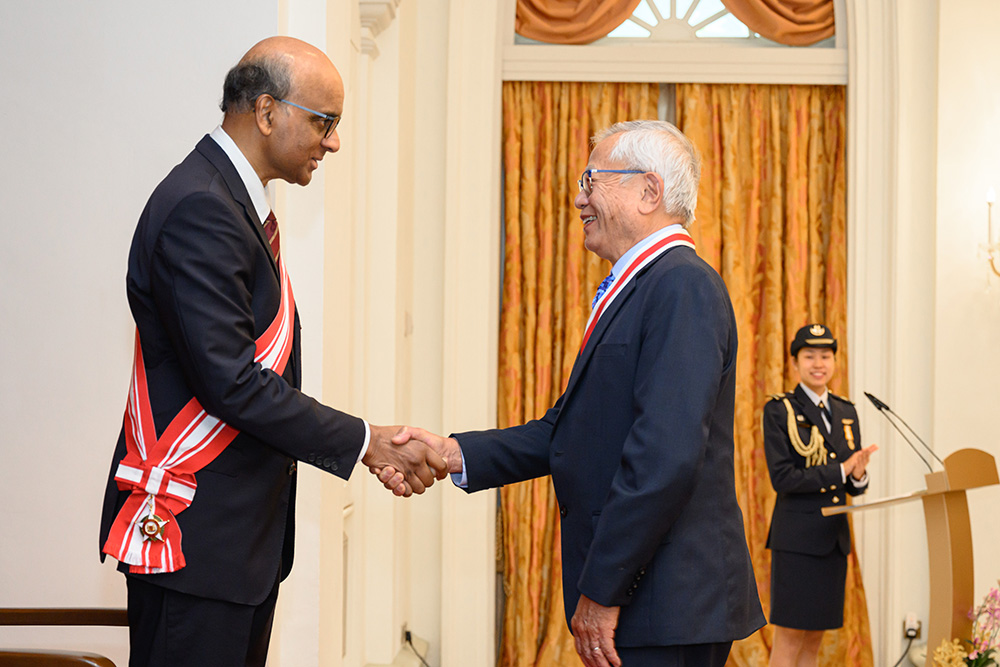
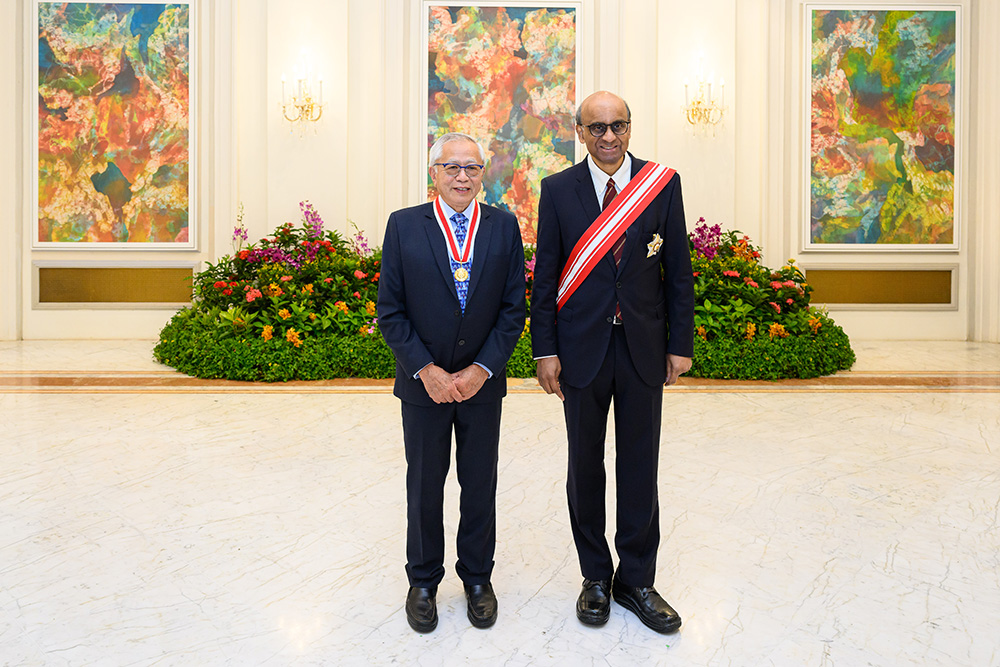
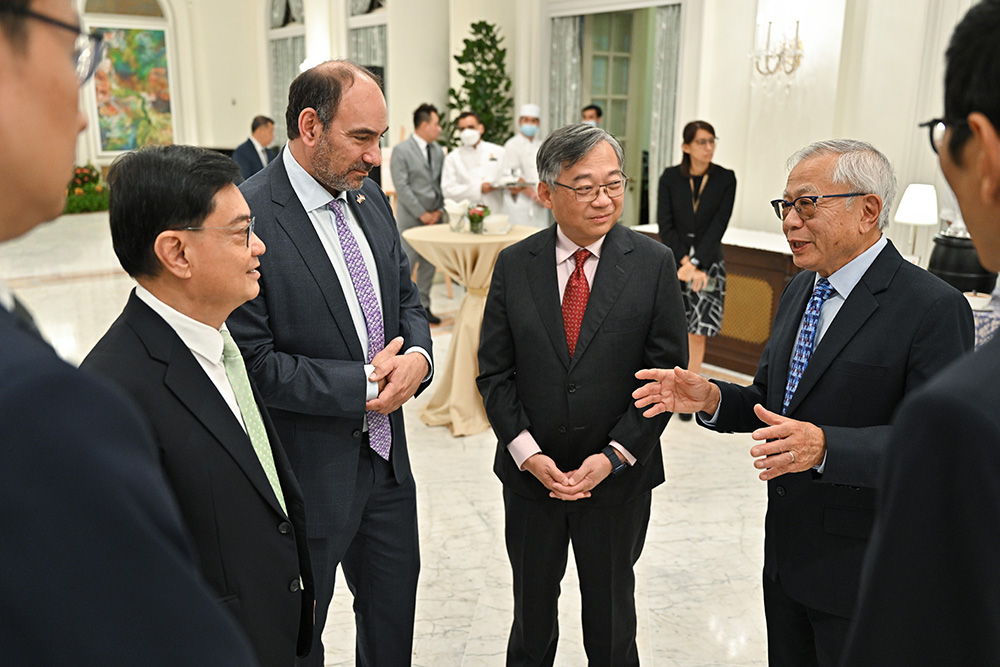
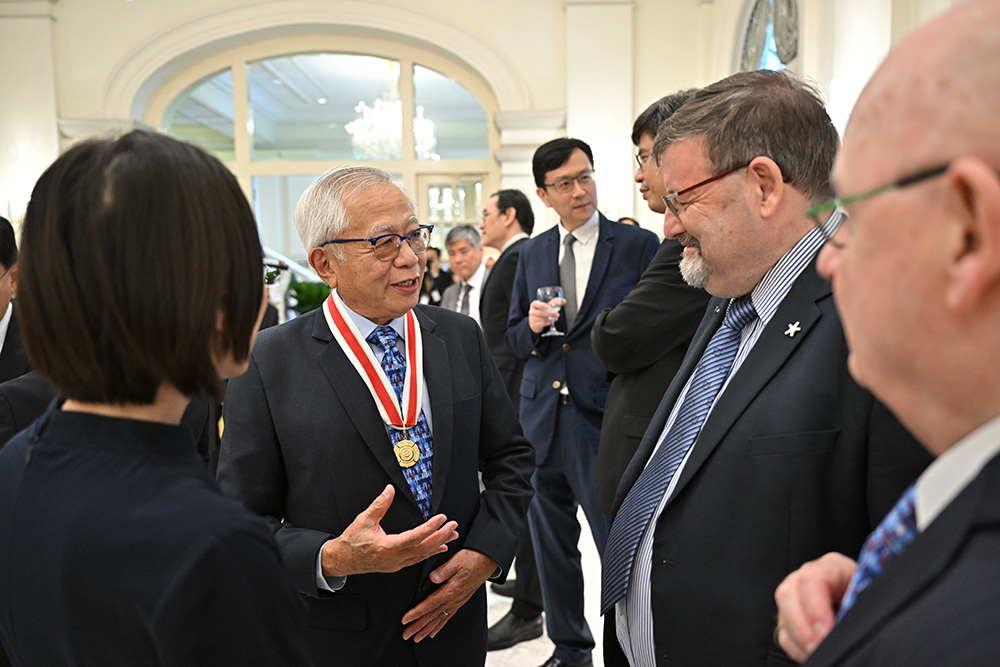
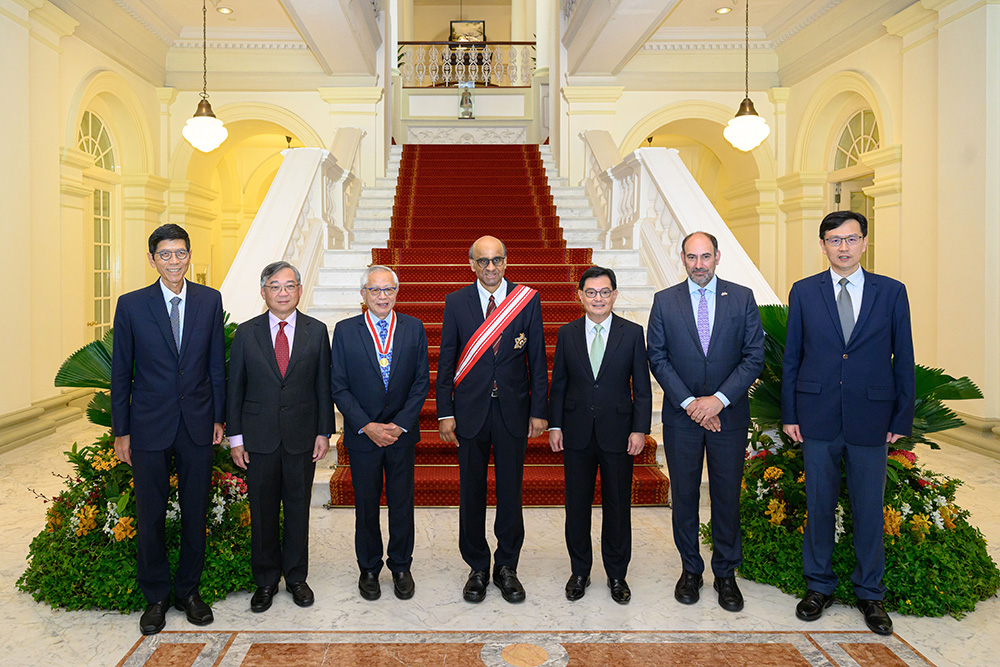
(L to R) Prof Tan Chorh Chuan, Chairman, A*STAR; Mr Gan Kim Yong, Minister for Trade and Industry; Prof William Chin, A*STAR Board Member and HCA 2023 recipient; Mr Tharman Shanmugaratnam, President of the Republic of Singapore; Mr Heng Swee Keat, Deputy Prime Minister and Coordinating Minister for Economic Policies; His Excellency Jonathan Kaplan, the United States Ambassador to Singapore, and Mr Frederick Chew, CEO, A*STAR, at the Istana on 23 October 2023.
SINGAPORE – Singapore has awarded Professor William Chin, Co-Chair of the Experimental Drug Development Centre Governing Board at A*STAR and Bertarelli Professor of Translational Medical Science and Medicine Emeritus at Harvard Medical School, with the Honorary Citizen Award for his invaluable contributions to Singapore in the fields of science and technology. Mr Tharman Shanmugaratnam, President of the Republic of Singapore, conferred the award on Professor Chin at a ceremony held at the Istana today.
The Honorary Citizen Award (HCA) is the highest form of recognition bestowed by the Singapore Government for outstanding contributions by a non-Singaporean to the country’s growth and development. It is conferred on those who have made a significant impact in the areas of business, science and technology, information communications, education, health, arts and culture, sports, tourism, community services or security. Please refer to Annex A for more information on the Honorary Citizen Award, and Annex B for the biography of the awardee.
Professor William Chin
Professor William Chin has been a member of the A*STAR Board since 2011, where he has been instrumental in advising A*STAR and Singapore’s Research, Innovation and Enterprise (RIE) ecosystem on health and biomedical sciences initiatives. He has made distinguished contributions to biotherapeutics research in Singapore and played a catalytic role in the creation of the Experimental Drug Development Centre (EDDC) national platform. Professor Chin also participated in and driven a range of collaborative projects with various stakeholders in the biomedical research ecosystem, including universities, medical institutes and biotechnology companies, nurturing many local scientists in the process.
Prior to his appointment as an A*STAR Board member, Professor Chin held various positions on A*STAR Biomedical Research Council project review panels and strategy groups, reviewing key projects in skin research, human development and non- communicable diseases. Among the proposals reviewed was the establishment of the Drug Discovery and Development (D3) unit, which aimed to support drug development processes from pre-clinical to clinical stages in Singapore. D3 would later merge with the Experimental Therapeutics Centre (ETC) and Experimental Biotherapeutics Centre to form the Experimental Drug Development Centre (EDDC). Together with Duke-NUS Medical School and the Experimental Therapeutics Centre (ETC), D3 progressed Singapore’s first two publicly funded cancer drugs, ETC-159 and ETC-206. The latter is licensed to Singapore-based biotech company AUM Biosciences. The company has since announced two major pharma clinical collaborations using the molecule in combination with immunotherapy for solid tumours.
Professor Chin is currently the co-Chair of the EDDC Governing Board. Under his stewardship, EDDC has continued to progress its portfolio of drug discovery and development projects, and generated value through creating and supporting biotech startups, as well as licensing several technologies to pharmaceutical companies.
Professor Chin said, "I am very proud to see the increasing growth of Singapore’s biomedical research ecosystem. In the past decade, Singapore has punched above its weight as a small nation and created impact for the world. A*STAR has been a key contributor to the research ecosystem, using excellent science to improve health and societal outcomes for all. With the same goal, I am positive that EDDC will continue to drive more drug development pipelines and translate scientific excellence into medicines that benefit patients. I am truly grateful for the opportunity to help Singapore over the years."
Mr Frederick Chew, Chief Executive Officer of A*STAR, said, "Professor Chin is very well- respected internationally, and Singapore’s R&D ecosystem has benefitted tremendously from his counsel, networks and leadership. As A*STAR’s board member and through various ecosystem advisory roles over the years, he has worked hard to help Singapore’s RIE ecosystem translate good science into health and economic impact. I congratulate Professor Chin on this well-deserved award, and look forward to his continued contributions in the years to come."
Enclosed:
ANNEX A – Info on the Honorary Citizen Award
ANNEX B – Biography of Professor William Chin
ANNEX A – INFO ON THE HONORARY CITIZEN AWARD
Honorary Citizen Award
The title of Honorary Citizen is a national award conferred by the Singapore Government
since 2003 to recognise and acknowledge the contributions of non-Singaporeans who
have rendered extensive and valuable services to Singapore and its people, or who have
made a significant impact in the areas of business, science and technology, information
communications, education, health, arts and culture, sports, tourism and community
services or security.
The Honorary Citizen Award is the highest form of national recognition for a non- Singaporean.
The title of Honorary Citizen is conferred for life.
ANNEX B – BIOGRAPHY OF PROFESSOR WILLIAM CHIN
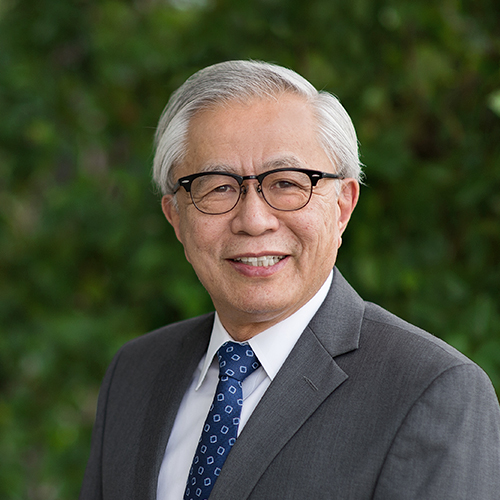
Professor William Chin is currently Co-Chair of the Experimental Drug Development Centre (EDDC) Governing Board, and Bertarelli Professor of Translational Medical Science and Medicine Emeritus at Harvard Medical School. He previously served as Chief Medical Officer and Executive Vice President at PhRMA and Executive Dean for Research at Harvard Medical School, following a 10-year career at Eli Lilly, where he was most recently Senior Vice President for Discovery Research and Clinical Investigation. Professor Chin is a Harvard-trained endocrinologist and longstanding faculty member. During his tenure as a faculty member in the Department of Medicine at Brigham and Women’s Hospital, he was chief of the Genetics Division and a Howard Hughes Medical Institute (HHMI) investigator and professor of medicine at HMS.
Professor William Chin has been a member of the A*STAR Board since 2011, where he has been instrumental in advising A*STAR and Singapore’s Research, Innovation and Enterprise ecosystem on health and biomedical sciences initiatives, particularly on translating good science into health and economic impact. He has made distinguished contributions to biotherapeutics research in Singapore and played a catalytic role in the creation of the Experimental Drug Development Centre (EDDC). Professor Chin has also participated in and driven a range of collaborative projects with various stakeholders in the biomedical research ecosystem, including universities, medical institutes and biotechnology companies, nurturing many local scientists in the process.
During his time at Eli Lilly from 1999 to 2010, Prof William Chin played an important role in expanding Lilly Systems Biology in Singapore to become the Lilly Singapore Centre for Drug Discovery. This end-to-end drug discovery unit collaborated extensively with local research institutes such as the Institute of Molecular and Cell Biology (IMCB), Singapore Institute for Clinical Sciences (SICS) and the Experimental Therapeutics Centre (ETC) 1 , as well as SingHealth’s National Neuroscience Institute.
Prior to his appointment as an A*STAR Board member, Professor Chin held various positions on A*STAR Biomedical Research Council project review panels and strategy groups, which reviewed key ecosystem projects in skin research, human development and non-communicable diseases.
Among the proposals reviewed was the establishment of the Drug Discovery and Development unit, or D3, which supported drug development efforts from pre-clinical to clinical stages in Singapore. Together with Duke-NUS Medical School and ETC, D3 progressed Singapore’s first two publicly funded cancer drugs, ETC-159 and ETC-206, with the latter licensed to Singapore-based biotech company AUM Biosciences. The company has since announced two major pharma clinical collaborations using the molecule in combination with immunotherapy for solid tumours. D3 would later merge with the Experimental Therapeutics Centre (ETC) and Experimental Biotherapeutics Centre (EBC) to form the Experimental Drug Development Centre (EDDC).
As co-Chair of the EDDC Governing Board, Professor Chin has been instrumental in helping EDDC bridge the drug development gap in Singapore, attract research investments and catalyse the biopharma ecosystem. Under his leadership, EDDC rapidly increased its portfolio, close deals, supported biotech startups and licensed several technologies to pharmaceutical companies.
Professor Chin has been a tireless advocate for the creation of a vibrant biotherapeutics community within Singapore, and has played a pivotal role in the development of Singapore’s health and biomedical sciences landscape and capabilities.
Was This Article Helpful?
A*STAR celebrates International Women's Day

From groundbreaking discoveries to cutting-edge research, our researchers are empowering the next generation of female science, technology, engineering and mathematics (STEM) leaders.
Get inspired by our #WomeninSTEM

